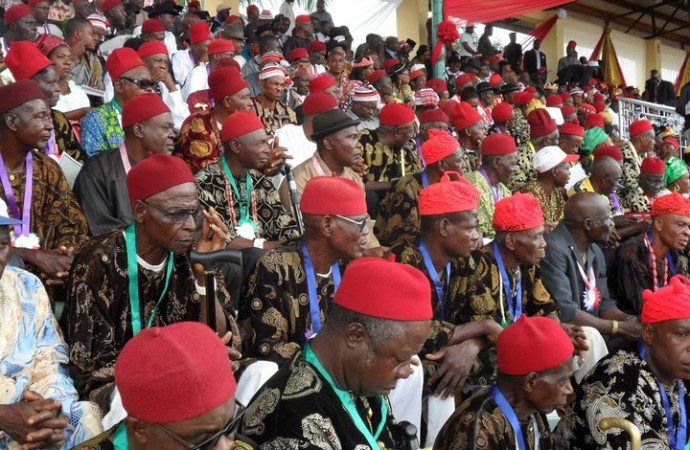The recent attack on Senator Ike Ekweremadu in Nuremberg Germany by suspected IPOB members have generated wide condemnation. Ekweremadu was to give a keynote address at the Second Igbo Annual Cultural Festival and Convention organised by Ndi-Igbo Germany in that city when he was reportedly physically attacked. Amid the criticisms that trailed the attack, Nnamdi Kanu, the maximum leader of IPOB, was quoted as saying that the attack on the former Deputy Senate President, was a ‘courageous act’ and a ‘polite warning.’ He further said: “The courageous act by IPOB at Nürnberg, Germany, is a polite warning to those engaged in selling our collective interest to Fulani caliphate. Nwodo (OhanaezeNdigbo president, NniaNwodo), Igbo governors are warned.” He was equally reported to have placed a N1m bounty for information on the itinerary of those it claimed encouraged Operation Python Dance in the South-eastern Nigeria
In this reflection I am borrowing and adapting the Marxist notion of ‘lumpen proletariat’ to generally describe IPOB supporters.
In Marxist theory, the lumpen proletariat is regarded as the lowest stratum of the industrial working class. The lumpen proletariat in Marxist theory include gangsters, racketeers, swindlers, petty criminals, tramps, the chronic unemployed and unemployable and all sorts of declassed, degraded and degenerated elements. In moments of economic dislocations and hardships, there is a tendency for the rank of the lumpen proletariat to swell. IPOB taps into the generalized discontent in Igboland.
In place of the Marxian notion of the ‘lumpenproletariat’ I will substitute ‘traderiat’ as IPOB’s foot soldiers tend to be people closely aligned to commerce or declassed from it. In this sense, the ‘lumpen traderiat’, refers to the underclass of the trading /commercial wing of the Igbo and others easily drawn to the simplistic binaries of ‘we’ versus’ them which IPOB thrives on. This group and their intellectual representatives are divorced from the mainstream Igbo commercial and intelligentsia class who privately see IPOB’s strategies as reprehensible, simplistic and unsustainable. Like the lumpen proletariat, the vision of the Igbo lumpen traderiat (apart from seeing everyone as an enemy) is foggy and inchoate, and therefore unappealing to those who believe that even if Biafra must be created, the strategy to actualize such must take into consideration the fact that no one can be an island unto himself, and that Biafra, if it must be created, must be done in such a way to ensure that it has friendly neighbours to be able to have peace with itself. Mainstream Igbo criticisms of IPOB strategy hinge on its confusion of bravado for bravery, and rudeness for direct talk.
There are a number of observations arising from the IPOB-inspired attack on Ekweremadu:
One, if Igbo mainstream is ideologically at loggerheads with IPOB, why was there apparently so much support for Nnamdi Kanu when he was incarcerated? And why did leading Igbo politicians rally to meet the nearly impossible bail conditions given to Nnamdi Kanu? As I wrote severally, agitation for Kanu’s release was actuated more by a defence of ethnic pride than a belief in the ideology or strategy of IPOB. Besides, it was also seen as selective justice in Igboland that while the Fulani herdsmen were treated with kids’ gloves, the government descended heavily on IPOB, which was then unruly but largely non-violent. Again it is believed that in a country like ours where the basis of nationhood remains contested, groups like IPOB, OPC and Boko Haram (under Jonathan) are often tolerated by their ethnic in-groups (even if they disagree with their strategies) for the noise value they provide in political bargaining and for countervailing similar groups across the country. However, when such groups cross the line (as Boko Haram did in the North when it began attacking mosques and everyone) and as IPOB just did with the attack on Ekweremadu, it may not longer count on its mainstream to keep studied silence. To paraphrase Chinua Achebe, when a deity starts getting swollen headed, the locals may be forced to remind it of the wood from which it was fashioned.
Two, there have been some attempts to sociologically explain away the attack on Ekweremadu as a revolt against the political class. For instance my friend and brother Osita Okechukwu, the DG of Voice of Nigeria, fell into that error when he declared that while he joined others in condemning the attack, a “careful perusal of the comments from the viral video gazetted angry young men, many of who could have remained in Nigeria, if Senator Ekweremadu had prudently executed his constituency projects. For instance, where are the Youth Vocational Centers he presided over?” I refuse to buy this. If IPOB’s action was actuated by the demand for good governance, then one can also ask how many hospitals IPOB has built in Igboland, and how much of the humongous sums it reportedly raises is deployed in fighting insecurity, kidnapping or offering scholarship to people in Igboland? What role has it played in the herdsmen’s and other crises in Igboland and across the country? You cannot offer what you do not have. So following this perspective, people can also bring the same charge against IPOB for not offering leadership by example.
In fact Osita Okechukwu contradicted himself when he said: “Sincerely speaking, our youths should join the agrarian revolution initiated by President Muhammadu Buhari…. Back to land is the answer, especially now that the National Economic Council has proposed the National Livestock Transformation Plan, to curb the Herdsmen menace in farmlands.” If ‘back to land’ is the answer, then it may be germane to ask whether the children of our Ministers and political appointees like Osita Okechukwu are also heeding the call by directing their children to make a career in farming. If not, then there is also a gap between what they preach and what they practice – the same thing that some claim animates the anger of groups like IPOB. I share the position of Chief Nnia Nwodo, the President of Ohanaeze Ndigbo that IPOB is now metamorphosing into a violent and dangerous organisation.
Three, some have also argued that the right to protest and piquet is part of the democratic process. This is true. But your rights to protest stops where others’ rights begin. For instance, it is commonly accepted that when people involved in protests begin physically to attack others they disagree with, then their rights conflict with the affected people’s freedoms – freedom of movement, speech, peaceful assembly and the right to be left alone if they have not broken any known laws.
Four, let me mention that moments after the Attorney General of the Federation Abubakar Malami appeared on BBC to give reasons for the declaration of the declaration of IPOB as a terrorist organization on on September 18, 2017, under the Terrorism (Prevention) Act 2013, I appeared on the same BBC to disagree with him on that. I explained that while countries use different definitions of terrorism to designate groups they want to de-legitimize, many terrorism researchers will focus on some indices – the group must operate in cells, conceal their identity, be affiliated to an international terrorist groups and attack innocent targets as a way generalizing fears in the society. I argued that IPOB was (and remains in my opinion) an insurgency, not a terrorist group. Unfortunately by threatening to carry out attacks across on innocent targets across the world, IPOB may unwittingly be fulfilling two of the conditions terrorism researchers use to designate groups as terrorists – attacking innocent targets as a way of generalizing fear in the populace and being affiliated to a transnational terrorism franchise. I feel also that with the attack a number of countries may now willy-nilly put the group under security surveillance.
Five, in an article I published in this column on September 7 2017 entitled ‘Nnamdi Kanu and the Redeemer Complex’, I argued that a redeemer complex – also known as messianic complex – is a state of mind in which an individual holds a belief that he or she is a saviour of sorts. I further argued:
“The redeemer phenomenon is sometimes interpreted as part of man’s instinctive search for the ‘ultimate rescuer’- someone courageous and powerful enough to liberate and offer protection to people who feel oppressed or unjustly treated. Magical and spiritual powers are sometimes projected onto the assumed redeemer, which makes it possible for his followers to submerge their own individual egos and to unquestionably accept the assumed messiah as someone greater than themselves.
“It is generally believed that many cult leaders suffer from various forms of ‘messiah complex’. Leaders with messianic complex must not be confused with charismatic leaders. While the charismatic leader is usually a leader who has demonstrated intellectual or physical accomplishment in some fields or possesses special attributes that people admire, leaders with messianic complex often have no history of personal accomplishment, making outsiders to wonder what their followers found special about them.”
When a leader starts believing the hype of being a messiah of sorts, then authoritarianism follows. Fortunately Igbos take exceptional pride in their republicanism so the idea of a Maximum Leader, who issues ‘fatwa’ to others, is a complete anathema to Igbo cosmology.




